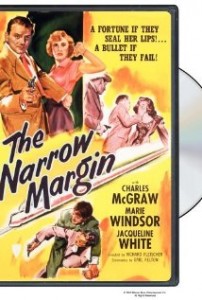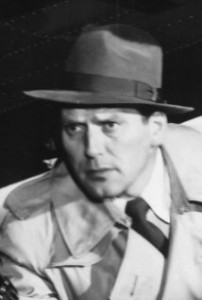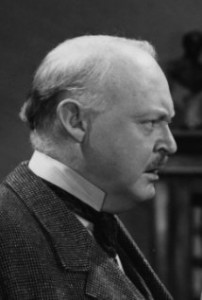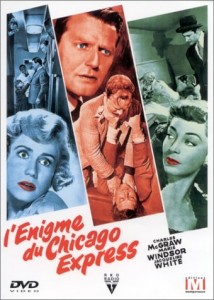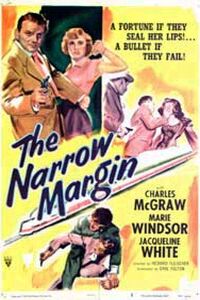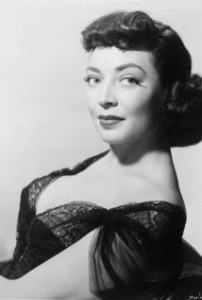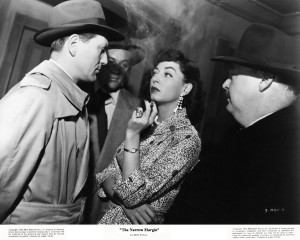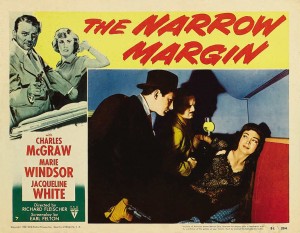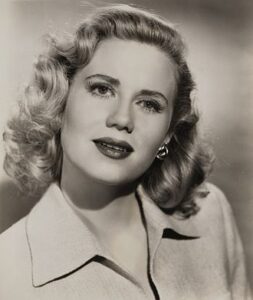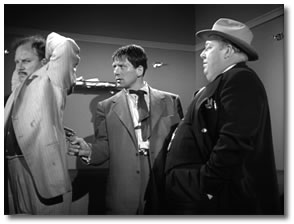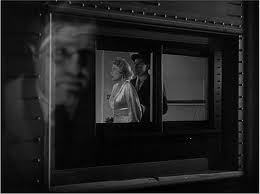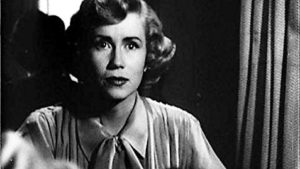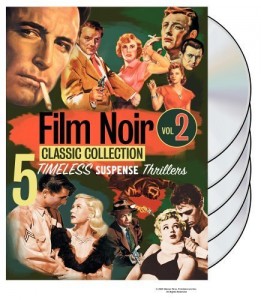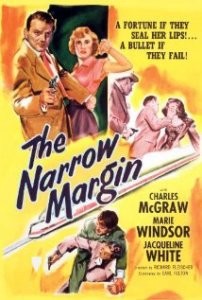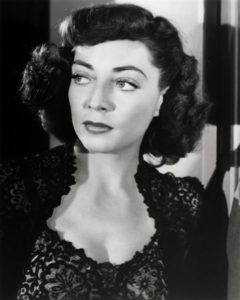The Narrow Margin ***** (1952, Charles McGraw, Marie Windsor, Jacqueline White, Don Beddoe) – Classic Movie Review 994
Director Richard Fleischer’s brilliant, deservedly celebrated 1952 B-movie film noir crime thriller The Narrow Margin is the best of its kind. Charles McGraw, Marie Windsor and Jacqueline White relish their moments of glory.
This fast-paced, gritty RKO Radio Pictures film studio classic, with a full cargo of thrills, romance and danger, is energetically acted and slickly made. It has everything, and everything is tightly packed into a running time of just 71 minutes. Humble and modest it may be, but it takes its place proudly as one of the great timeless classic film noir suspense thrillers.
Charles McGraw stars as Detective Sergeant Walter Brown of the Los Angeles Police Department, a stern, upright and resourceful cop who reluctantly accepts his orders to protect the life of a Mob trial key witness, Mrs Frankie Neall (Marie Windsor), a mobster’s brassy wife who is planning to testify to the grand jury against her husband in court.
So Brown and his older partner and friend Detective Sergeant Gus Forbes (Don Beddoe) are assigned to escort an undercover Mrs Neall on the train trip across America from Chicago to Los Angeles, and to fend off frenzied attempts to kill her from Mob assassins as she rides the train. She is also carrying a Mob payoff list belonging to her murdered husband. The Mob want the list and want her dead, but the Mob’s hit men do not know what she looks like.
The detectives pick up the disagreeable Mrs Neall at her apartment, but are waylaid by a waiting Mob assassin named Densel (Peter Virgo), who escapes. Brown is followed to the train station by gangster Joseph Kemp (David Clarke), who spots him as the detective before they board the train.
It is a simple but great set-up. The unpublished original story titled Target by Martin Goldsmith and Jack Leonard was rightly considered original and startling enough to be Oscar nominated as Best Motion Picture Story, and screenwriter Earl Felton builds on this set-up to provide an ideal, hard-boiled screenplay, with credible, exciting, well-crafted situations, scenes and dialogue.
Along with the mounting suspense, there are a few surprises, even shocks, along the twisty way, and some well-staged acts of action violence too. The Narrow Margin is a dangerous, unpredictable, cynical world of violence and sudden death.
Fleischer’s direction sustains dramatic tension and visual intensity throughout, magnified by its claustrophobic setting on the Chicago-LA railroad. Fleischer’s direction really is imaginative and exciting, keeping it both stylish and real-seeming at the same time. In a bold move, he substitutes actual train sounds where music would normally be heard for dramatic effect. The film is much the richer for it.
On the train sets, he keeps his cameras moving, and his shots fluid and varied, but there are also some flavourful shots of train platforms and steam trains, sometimes tracking along the platform, but always busy and striking. There is plenty of period charm and atmosphere.
In his movie moment of glory, McGraw plays the unbending cop perfectly and Windsor is on her best form too as the gangster’s widow he is reluctantly protecting en route to the trial. By contrast, Jacqueline White gives a warm, charming performance as Ann Sinclair, an enigmatic passenger on the train, in Eva Marie Saint North by Northwest style.
Also notable are the rotund character actor Paul Maxey as the train’s fat passenger Sam Jennings, Peter Brocco as the sinister Vincent Yost, Harry Harvey as the kindly Train Conductor, and Peter Virgo and David Clarke as bad guys Densel and Joseph Kemp, plus Gordon Gebert as Ann’s brattish son Tommy Sinclair.
Unusually, there is no background music, and the film is all the better for it in terms of immediate realism. There are just a few brief moments when a phonograph is playing on Marie Windsor’s record player in her compartment.
Also in the cast are Jacqueline White, Queenie Leonard, Gordon Gebert, David Clarke, Peter Virgo, Paul Maxey, Harry Harvey, Milton Kibbee and Don Haggerty.
The Narrow Margin is directed by Richard Fleischer, runs 71 minutes, is released by RKO Radio Pictures, is written by Earl Felton (screenplay), from a story by Martin Goldsmith and Jack Leonard, is shot in black and white by George E Diskant, is produced by Stanley Rubin, and is designed by Albert S D’Agostino and Jack Okey. The score is stock music by Gene Rose, Leith Stevens, Dave Torbett and Roy Webb.
It was a 1953 Academy Award nominee Oscar for Best Writing, Motion Picture Story (Martin Goldsmith, Jack Leonard).
It was remade, very well too, by writer-director Peter Hyams in 1990 as Narrow Margin with Gene Hackman and Anne Archer.
The film was shot in the studio in just 13 days and the only part filmed on board a real train is a few seconds of the arrival in Los Angeles. One of the first directors to do so, Fleischer made much use of a handheld camera that could be brought into rooms. To save money, the train sets were fixed firmly to the floor and the camera was moved to simulate the train rocking.
The train takes the route of the old Santa Fe Railroad, the same route the Amtrak Southwest Chief takes now.
It was filmed in 1950 but not released until 1952 because RKO studio owner Howard Hughes heard good word about it and ordered a copy of it to view in his private screening room. The film stayed there unseen for more than a year as the eccentric Hughes forgot about it.
When he did see it, Hughes was so impressed he planned to remake it with Robert Mitchum and Jane Russell, but decided against it. He did assign Fleischer to reshoot sections of the 1951 Mitchum-Russell film His Kind of Woman, with the screenwriter Earl Felton, providing uncredited rewrites.
McGraw also stars in another classic B-movie Armored Car Robbery (1950). He appears in Spartacus, The Birds, Hang ‘Em High, The Defiant Ones and Away All Boats.
Fleischer is fondly recalled for his early film noirs The Clay Pigeon (1949), Bodyguard (1948), Follow Me Quietly (1949), Armored Car Robbery (1950) and The Narrow Margin (1952).
The cast are Charles McGraw as Detective Sergeant Walter Brown, Marie Windsor as Mrs. Frankie Neall, Jacqueline White as Ann Sinclair, Peter Virgo as Densel, Gordon Gebert as Tommy Sinclair, Queenie Leonard as Mrs Troll, David Clarke as Joseph Kemp, Don Beddoe as Detective Sergeant Gus Forbes, Paul Maxey as Sam Jennings, Peter Brocco as Vincent Yost, Harry Harvey as as Train Conductor, Milton Kibbee, and Don Haggerty.
Jacqueline White
It is the last film of Jacqueline White, who retired from the film industry in 1952 following her marriage in 1948 to Neal Bruce Anderson. She relocated to Wyoming with her husband, who started an oil business. She was born on 27 in Beverly Hills. She turned 100 on 27 2022.
She had a 10-year career in Hollywood from 1942 until 1952 in around 20 films. She is remembered for Air Raid Wardens (1943) with Laurel and Hardy, Return of the Bad Men (1948), Mystery in Mexico, (1948), Crossfire (1947) and The Narrow Margin (1952).
Gordon Gebert
Gordon Gebert (born in Des Moines, Iowa, on October 17, 1941) played Janet Leigh’s son Timmy in Holiday Affair and appeared in nine full-length feature films from 1949 to 1955, including the noir films The Narrow Margin and The House on Telegraph Hill, as well as playing Audie Murphy as a boy in To Hell and Back. He trained as an architect and has taught at The City College of New York.
© Derek Winnert 2014 Classic Movie Review 994
Check out more reviews on http://derekwinnert.com/

